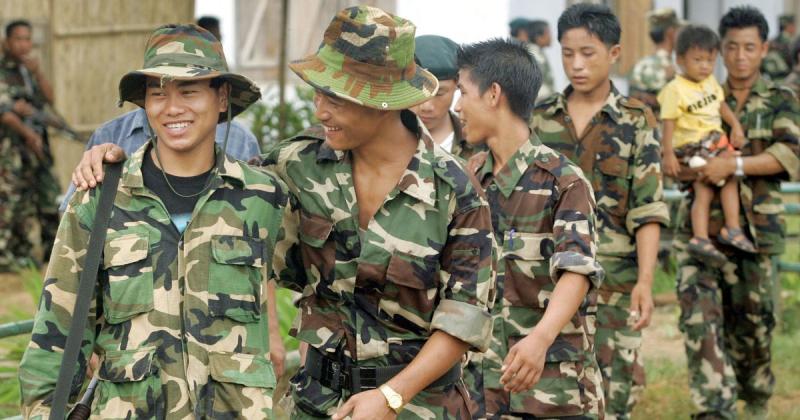By Phyo Thiha Cho / Myanmar Now
A faction of the National Socialist Council of Nagaland (NSCN) will not be allowed to sign the Nationwide Ceasefire Agreement (NCA) because of the ethnic Naga armed group’s core demand for an independent Naga homeland spanning either side of the Myanmar-India border, according to government spokesperson U Zaw Htay.

Naga armed cadres in the Indian state of Nagaland (Photo: Reuters)
Zaw Htay was speaking at the Union Peace Conference, taking place 11-16 July in the capital Naypyidaw. The conference, also known as “21st Century Panglong,” is one of a series convened by State Counsellor Daw Aung San Suu Kyi to build consensus towards a peace accord that would end decades of conflict with an array of ethnic armed groups.
The NCA, conceived as a foundation stone for the peace process, was signed between the Myanmar government and eight ethnic armed groups in 2015. They have since been joined by two other groups, but most of the more powerful groups remain outside of the agreement.
The NSCN-Khaplang, named after the factional leader S.S Khaplang, who broke ranks with other leaders in the Naga cross-border insurgency, signed a ceasefire with the Myanmar government in 2012 and was allowed to open a liaison office in the town of Hkamti. Khaplang died of ill health last year in Myanmar.
Though NSCN-Khaplang’s headquarters are in northwestern Myanmar, close to the Indian border, its main engagements have been with the Indian Army and it has not fought with the Myanmar army since 2012.
Responding to an NSCN-Khaplang ambush on Indian soldiers in 2015, the Indian government branded it a terrorist group and allegedly conducted cross-border raids on its camps, though the Indian government denied this. India accuses the group of using kidnapping and extortion to fund its activities.
The group’s demand for a sovereign Naga homeland, which they call Nagalim, incorporating areas of both India and Myanmar, marks it out from most other ethnic armed groups in Myanmar, which demand autonomy within Myanmar.
Like other groups that have not signed the NCA, the NSCN-Khaplang is merely observing the current peace conference in Naypyidaw.
“We can’t agree to divide the country. It is difficult to negotiate with groups that hope for a separate country,” said Zaw Htay on July 16. Zaw Htay is also a member of the Union Peace Dialogue Joint Committee (UPDJC) secretariat, which organises peace talks.
However, Zaw Htay said the group itself was not prepared to sign the NCA.
Another member of the UPDJC secretariat, U Hla Maung Shwe, said the NSCN-Khaplang could only join the NCA if they abandoned the idea of “separation.” Myanmar’s 2008 Constitution bars any attempt to secede from the Union.
About 2 million Naga people, who are predominantly Christian, live in mountainous terrain that spans the northeastern Indian states of Nagaland, Manipur, Arunachal Pradesh and Assam, as well as Sagaing Region in northwestern Myanmar.
Myanmar’s Constitution outlines a Naga Self-Administered Zone comprising the townships of Lahe, Leshi and Nanyun in Sagaing Region, but this provides for minimal autonomy.







 What Does Your Face Say About Your Health?
What Does Your Face Say About Your Health? Meet R.N. Ravi, who is mediating peace with the Nagas
Meet R.N. Ravi, who is mediating peace with the Nagas The Top Viral YouTube Videos of 2017
The Top Viral YouTube Videos of 2017 The last Konyak headhunters of Nagaland
The last Konyak headhunters of Nagaland






Leave a Reply
Your email address will not be published. Required fields are marked (required)